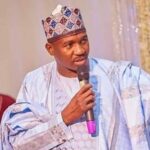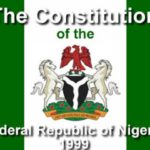This year’s general election is the seventh since the restoration of democracy in the country. The previous elections were held in 1999, 2003, 2007, 2011, 2015 and 2019.
It has been described as the most keenly contested poll in Nigeria’s contemporary political history, with 18 registered parties on the ballot.
But voter turnout was largely low compared to the number of people that collected the permanent voter cards (PVCs).
Despite a steady rise in the number of registered voters in Nigeria’s six election cycles since 1999, the country has witnessed a gradual decline in voter turnout.
- Lalong, Sanwo-Olu, Gbajabiamila others congratulate Tinubu
- No regret losing senatorial election – Ikpeazu
Data from the Independent National Electoral Commission (INEC) showed that 93,469,008 people registered across the country for the 2023 elections, the highest since 1999. The figure shows a 61.3 per cent rise from the 57.9 million voters who registered for the country’s election in 1999.
According to INEC, 87,209,007 PVCs have so far been collected. There are a total of 6,259,229 uncollected PVCs.
However, statistics at the end of the collation of the presidential election results revealed that 24,965,218 voted in the election. This is 28.62 per cent of the PVCs actually collected and 26.7 per cent of the registered voters.
That is less than the 35 per cent and 43 per cent recorded in the 2019 and 2015 presidential elections, respectively.
For instance, in Kwara State, there are 1,695,927 registered voters but only 497,519 were accredited for Saturday’s election, while the total number of votes cast was 496,683. This represents 32 per cent as against 42.3 per cent recorded in the 2019 presidential election.
In Gombe, there are 1,575,794 registered voters with 542,997 accredited but only 542,997 were the actual voters. This represents 35 per cent as against 44 per cent in 2019.
In Lagos with 7,060,195 registered voters, 1,347,152 voted in the election. This represents 22 per cent as against 21 per cent recorded in the last election.
But in Jigawa with 2,341,041 registered voters, 954,805 voted in the election. This represents 42 per cent as against 71 per cent recorded in the last presidential election.
Daily Trust reports that the INEC chairman, Prof. Mahmood Yakubu, in the early hours of Wednesday declared the candidate of the All Progressives Congress (APC), Asiwaju Bola Tinubu, as the winner of the presidential election.
Tinubu polled 8,794,726 votes to defeat Atiku Abubakar of the Peoples Democratic Party (PDP) who had the second-highest figure with 6,984,520 votes, while Peter Obi of Labour Party (LP) was third with 6,101,533 votes.
The candidate of the New Nigeria People’s Party (NNPP), Rabiu Musa Kwankwaso, got 1,496,687 votes to come fourth. The remaining votes were shared among other political parties.
Why low voter turnout in 2023
Experts have highlighted possible reasons why Nigeria experienced low voter turnout in the just concluded presidential and National Assembly elections.
Speaking on the development, Executive Director Civil Society Legislative Advocacy Centre (CISLAC) and Chairman of the Transition Monitoring Group (TMG), Mallam Auwal Musa Rafsanjani, told Daily Trust that the disappointment witnessed by Nigerians in the last eight years despite their support for the administration was one of the reasons for the low voter turnout in Saturday’s elections.
While also listing refusal of candidates to attend debates as another factor, Rafsanjani urged INEC to redeem its image by boosting the confidence of Nigerians, which was affected by the iReV result portal failure and other avoidable lapses witnessed last Saturday.
Also, the Executive Director, Resource Centre for Human Rights and Civic Education (CHRICED), Dr Ibrahim M. Zikirullahi, said that the Naira redesign policy and fuel scarcity were part of the major factors of low turnout of voters, particularly youths, resulting in the disenfranchisement of many voters who were unable to afford transportation to the polls.
“If all these factors of Naira and fuel scarcity, as well as insecurity at the polls, and poor performance of INEC are put together, you get the reason why it seems there was low voting. Then insecurity in many parts of the country contributed to low turnout of voters because many voters were scarred. All these must be addressed to correct the anomalies.”
Also speaking on the issue, a development expert and Executive Director, Center for Transparency and Integrity Watch, Umar Yakubu, said “the low turnout was contrary to the expectations of Nigerians even as Nigeria had 10 million additional registered voters.
“The turnout also contradicts accounts of Nigerians who said people turned up in numbers at their polling units to vote,” he said.
Also speaking, a human rights activist, Victor Ago, said the inability of INEC to transport election materials to rural areas contributed to low voter turnout.
“If you look at the elections generally, sensitive and non-sensitive materials did not reach the designated areas early, some as late as 4pm. Among the electorate you have elderly people who have been at the polling unit since 7am. Do you expect them to wait this long?”
Speaking further, he said the delay in starting the election process also played a huge role, as INEC officials did not start the process early enough, which made some people abandon the entire exercise.
“For instance, in the FCT here, I know where voting started around 5pm and ended in the early hours of Sunday, which is an abnormality. All these are factors,” he said.
On the way forward, Agi believes that INEC must improve its transport logistics drive.
Another expert with TechHer, Kelechi Damian, attributed the low voter turnout in the elections to the pockets of security challenges and voter intimidation experienced in some parts of the country.
Speaking on the way forward, Damian suggested a more holistic approach in securing polling units to assure voters of their safety.
By Kamarudeen Ogundele, Abbas Jimoh & Philip Shimnom Clement (Abuja)

 Join Daily Trust WhatsApp Community For Quick Access To News and Happenings Around You.
Join Daily Trust WhatsApp Community For Quick Access To News and Happenings Around You.

